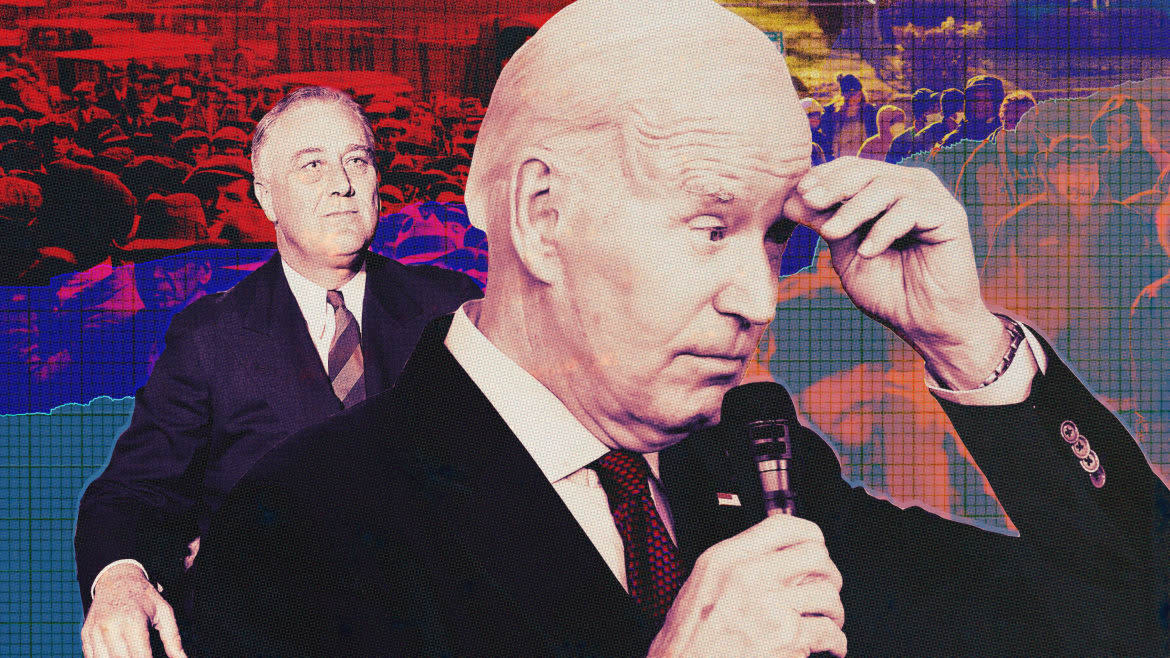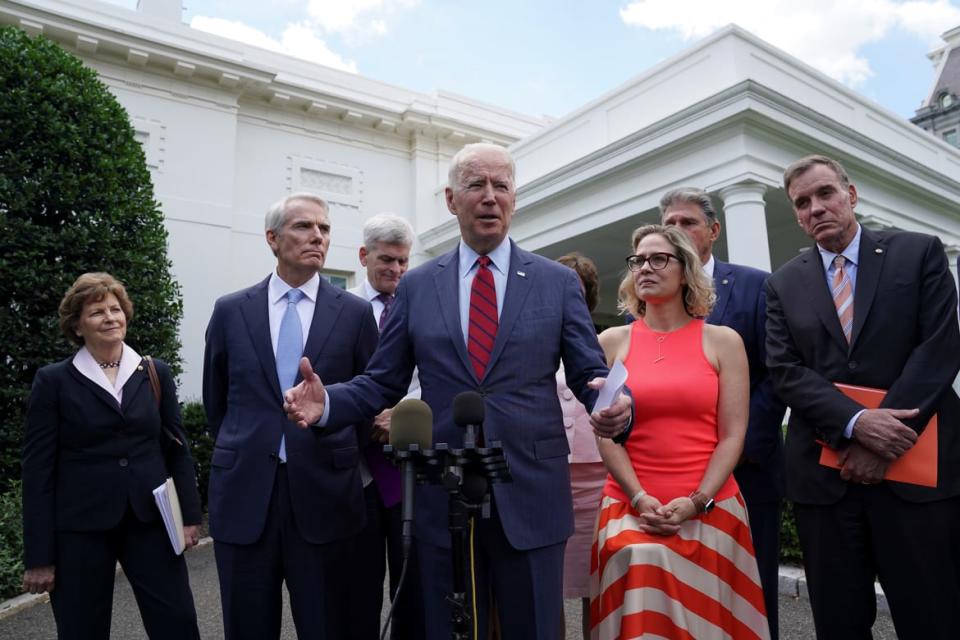Biden’s Debt Ceiling Waffling Proves He’s No FDR

Joe Biden is the new FDR, right? I mean, that’s what we were told over and over again—for years. Time magazine gave us the headline, “How Joe Biden is Positioning Himself as a Modern FDR.” Three months into Biden’s term, CNN chipped in with “Three Striking Similarities Between FDR and Biden.” The New Republic won the most absurdly effusive headline contest with “Forget FDR. Biden is a Major President in His Own Right.”
Turns out it was all a bad joke. If that wasn’t obvious before the fight over the debt ceiling, it should be now.
The president has multiple legal options for challenging or completely ignoring the debt limit. Instead of pursuing any of them, he’s negotiating with Republicans about ways to make America’s welfare state—always a pale and stunted thing by global standards—even more miserly.
How a Boston Lawsuit Could Get Us Out of the Debt Ceiling Mess
How the “New FDR” Ended Up Haggling Over Work Requirements
The initial wave of comparisons between Joe Biden and Franklin D. Roosevelt was inspired by 2021’s “American Rescue Plan.” A much-touted bit of number-crunching by Columbia University’s Center on Poverty and Social Policy found that the ARP’s expansion of the child tax credit would “cut child poverty by half.” Sounds pretty FDR-ish!
Except for the fact that the ARP was a COVID relief bill that created no permanent programs. In fact, it was strikingly similar to the temporary COVID relief bill that had been signed the year before by a president no one ever compared to FDR—Donald J. Trump. Both bills temporarily lifted millions of children (and adults) out of poverty—and pushed them right back into it when they expired.
No one in the media seemed too bothered by that detail at the time, and anyway Biden was talking about an ambitious spending bill that would permanently expand the welfare state. Progressives were excited, and it’s little wonder—it was supposed to include everything from universal pre-K to paid family and medical leave to free community college. If Biden and the Democratic leadership in the House and Senate had ever made a serious attempt at passing this package—even if they’d lost—the FDR comparisons would ring less hollow.

President Joe Biden speaks following a bipartisan meeting with U.S. senators about the proposed framework for the infrastructure bill, at the White House in Washington, DC, June 24, 2021.
Instead, it was almost immediately split off into two bills—a bipartisan bill full of Chamber of Commerce-friendly infrastructure spending, and the “Build Back Better” bill with all the stuff corporate America was guaranteed to fight to the death to stop. We were told that this was a “two-track strategy” that would lead to both eventually becoming law. What actually happened, as anyone who wouldn’t be routinely tricked by the “wallet inspector” from The Simpsons would have predicted, is that the bipartisan infrastructure bill sailed through Congress and BBB was left to die a slow and pointless death.
A couple pieces of the corpse were eventually revived as part of the “Inflation Reduction Act” and progressives were left to bicker over whether the IRA was even a net positive when the spending on “climate change and energy security” was balanced against the deregulation and new drilling. But the welfare state expansions were long gone.
The closest Biden came to fulfilling his original hype since then was his half-hearted attempt at providing some student debt relief. That’s a good idea as far as it goes, and I’ve defended it many times, although I’d also point out that the limits of Biden’s political imagination are telling. At a time when massive numbers of Americans struggle with medical debt and credit card debt, this is a form of debt relief that only would have helped a narrow base of college-educated voters.
Progressives Who Want Joe Rogan Off Spotify Should Be Careful What They Wish For
And now, when it comes to the people who most badly need assistance, Biden is negotiating with Republicans about exactly which social spending programs should come with Dickensian work requirements. (Are you a single mother who needs Medicaid to pay for your child’s medical bills? Or Temporary Assistance to Needy Families to help you make rent? We’ll talk once you’ve picked up a shift at McDonald’s. Those burgers don’t flip themselves. Oh, and the new layers of bureaucracy we’re adding to the assistance will for sure lead to errors and paperwork delays, sorry.)
Biden’s defenders might try to tell you that he wants to be a new FDR or LBJ—expanding the welfare state instead of signing onto these miserly contractions—but he has no choice. If Republicans don’t agree to raise the debt ceiling, America will go into default and the economic consequences would be catastrophic.
The problem with this alibi is that negotiating with Republicans isn’t even close to being Biden’s only option for avoiding a default.

Signs that read "Build Back Better" and "Expand Medicare" are seen as Senator Sherrod Brown speaks about the Build Back Better package outside the U.S. Capitol in Washington, Dec. 15, 2021.
Biden Ignores the Options
The 14th Amendment seems to forbid default—it says that “[t]he validity of the public debt of the United States, authorized by law” shall “not be questioned.”
Thus, there’s a straightforward legal argument that the entire idea of a “debt ceiling” is unconstitutional—that once Congress has authorized spending, it’s not allowed to prohibit the president from borrowing money to pay for it. And even those of us who don’t love to see courts override laws passed by democratically elected bodies would have the consolation, in this case, that we’d be talking about one law being overturned instead of letting the spending authorized by thousands of laws passed by Congress go up in flames.
Perhaps, if push came to shove, the Supreme Court would ignore the obvious meaning of the 14th Amendment and uphold the debt ceiling law. After all, the Court is dominated by conservatives who would love to hand the Biden administration a political L.
I don’t actually think that outcome would be inevitable. A global economic crisis would be pretty bad for key conservative constituencies, and there’s at least some question about whether the Court’s conservatives would be willing to take ownership of that outcome. But let’s assume for the moment that a constitutional challenge is off the table. What does that leave?
As Matt Bruenig of the People’s Policy Project has forcefully argued, if Congress refuses to raise the debt ceiling, they’ve (almost) given the president contradictory orders. On the one hand, they’ve commanded him to spend money through various authorizations. On the other hand, they’ve refused to let him pay for it.
Bruenig asks:
“Is the Supreme Court going to rule that, in that scenario, the president has the constitutional authority to unilaterally disregard some of the spending Congress has mandated the president to do? In this scenario, does the president get to choose what spending to disregard, sort of like a line-item veto, which the court has already ruled is unconstitutional even when Congress specifically passes a law giving the president line-item veto rights? Could Biden eliminate the entire Department of Defense once the debt limit is hit in order to get aggregate spending down to the levels financed by Congress?”
Democrats Averted Disaster, But the Working Class Did Not
If he really didn’t have any legal workaround, then this command to simultaneously spend and not spend would amount to a choice between violating thousands of laws and crashing the world economy in the process or violating one law of extremely dubious constitutional status and not crashing the world economy. The case for Door #2 would be compelling.
But the reason for the “(almost)” is that even if it refuses to raise the ceiling, Congress will have, however unwittingly, left Biden a few loopholes he could use to avoid breaking any laws.

President Franklin D. Roosevelt addresses American farmers about how the New Deal would work for them, while on the campaign trail in 1932, Topeka, Kansas.
One possibility is to sell bonds that wouldn’t technically count toward the limit given the wording of the debt ceiling law. Another is that, while the Treasury Department isn’t otherwise authorized to engage in “seignorage”—money creation—Congress has already long since granted a (seemingly narrow) exception. “31 USC 5112(k) gives the Treasury the authority to mint platinum coins in any denomination.”
Minting trillion dollar coins to get around a debt limit might not have been what lawmakers had in mind when they passed that provision in 1997, but the effects of laws aren’t limited to the ones that occurred to the representatives and senators who created them when they cast their votes—and “using a loophole carelessly baked into an existing law” sounds much more respectful of the rule of law than simply choosing to violate either the debt ceiling law or any of those thousands of laws authorizing spending.
But instead of using this, or one of the other possible loopholes, or even threatening to do so, Biden is negotiating about Republican demands to make life harder for poor people to ease the tax burden on rich people.
Roger Waters Is Not Helping to Bring Peace to Ukraine
So far it looks like he won’t give in to the demand for Medicaid work requirements, but he’s signaled openness to TANF work requirements—even though the track record of such requirements being tested on a state level shows that they do little to promote employment and the overwhelming majority of those who lose their benefits lose them not because they refuse to seek work but because they have trouble navigating the layers of bureaucracy created to enforce the requirement.
Oh, and the 14th Amendment route? A federal workers’ union is already challenging the constitutionality of the debt limit in court—and the Biden administration has filed paperwork indicating its intention to legally defend the debt ceiling.
FDR vs. JRB
You can argue that this is standard procedure when the federal government is being sued and it would be relatively unusual for the administration to decline to do so. But it’s absolutely not unprecedented—see for example, Windsor vs. U.S., when the Obama administration declined to defend the odiously anti-gay Defense of Marriage Act. The Biden administration would be within its rights not to defend the debt ceiling. It’s just not willing to lose respectability points by doing so.
We can speculate about why not—and I think Biden’s long record as a centrist favoring fiscal austerity when he was a senator gives us at least some reason to doubt that his heart was ever in the expansive new spending Democrats were floating in 2021. But the fact remains that FDR comparisons are deeply absurd.
When FDR fought with Republicans about raising the debt ceiling in 1943, the battle lines were drawn over his wartime proposal to set an absolute cap on the income of the wealthiest American by setting the highest marginal tax rate at 100 percent so that in effect the incomes would be capped at $25,000 a year—a little over $438,000 in today’s money. He shamed Congress for having “authorized the drafting of men into the armed forces at $600 a year regardless of what they had earned in civilian life” while “refus[ing] to reduce the salary of a man not drafted no matter how high his income might be.”
Not even FDR won every fight, and he didn’t get his 100 percent tax—but he did have a 94 percent top marginal rate by the time all was said and done.
I don’t idolize FDR—his mistreatment of Japanese-Americans during the war was shameful, and on deeper questions of capitalism and socialism I’m more of a Norman Thomas kind of guy. But comparing Joseph Robinette Biden to the father of the modern welfare state is absurd.
If Trump Is Prosecuted, George W. Bush, Cheney, and Kissinger Should Be Too
RBJ is a lot more like WJC—William Jefferson Clinton. He too spent his presidency haggling with Republicans about exactly how much pain to inflict on the poor.
The fact is that Biden ran against the guy who wanted to revive the spirit of the New Deal. The entire Democratic establishment coalesced around him to stop Sen. Bernie Sanders. It was always a little much to think he was going to turn around and govern like Bernie Lite.
Most politicians only do the right thing, when they do it at all, when they’re facing serious pressure from powerful movements for change. And the ugly fact is that the American Left at this point is little more than a few politicians, a few magazines, and the memory of the kinds of movements that once existed. Until these political facts on the ground have changed, we probably can’t expect better than Clintons and Bidens.
But let’s at least stop insulting historical memory by comparing them to FDR.
Get the Daily Beast's biggest scoops and scandals delivered right to your inbox. Sign up now.
Stay informed and gain unlimited access to the Daily Beast's unmatched reporting. Subscribe now.


